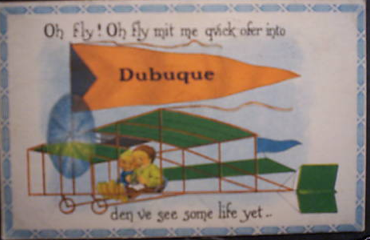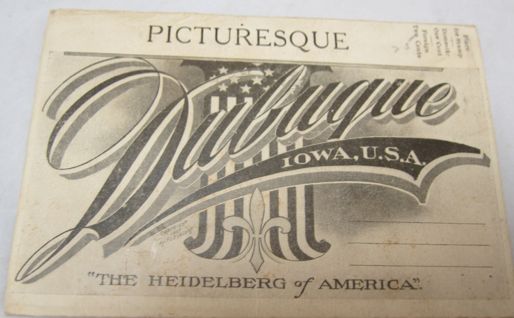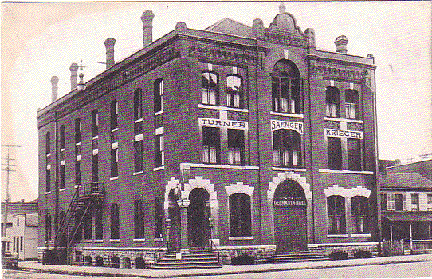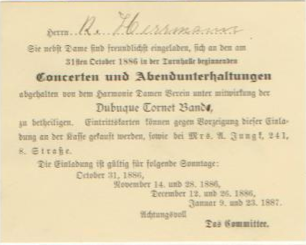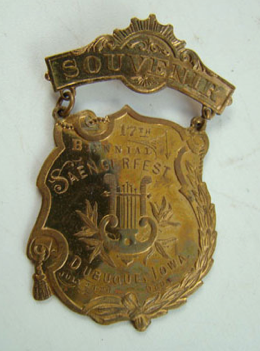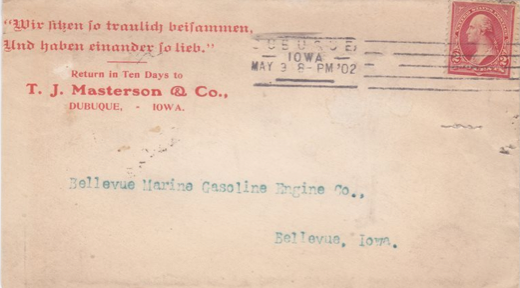Encyclopedia Dubuque
"Encyclopedia Dubuque is the online authority for all things Dubuque, written by the people who know the city best.”
Marshall Cohen—researcher and producer, CNN
Affiliated with the Local History Network of the State Historical Society of Iowa, and the Iowa Museum Association.
GERMANS: Difference between revisions
No edit summary |
No edit summary |
||
| Line 2: | Line 2: | ||
[[Image:flymit.png|left|thumb|250px|German heritage is even reflected in this humorous postcard.]] | [[Image:flymit.png|left|thumb|250px|German heritage is even reflected in this humorous postcard.]] | ||
[[File:heidelberg.jpg|250px|thumb|left|Packet of postcards describing the "Heidelberg of America," circa 1907]]GERMANS. German contributions to Dubuque began in the earliest days of the city's history. | [[File:heidelberg.jpg|250px|thumb|left|Packet of postcards describing the "Heidelberg of America," circa 1907]]GERMANS. German contributions to Dubuque began in the earliest days of the city's history. As one of two major ethnic groups in the community, Germans had an immediate disadvantage. Unlike the Irish, many were unable to speak English. (1) They did, however, have a similar informal caste system. "High Germans" and "lacy curtain Irish" were considered better than "low Germans" and "shanty Irish." (2) | ||
German immigrants first settled in an area bordered by White, Washington, and Central [[STREETS]] to 14th and Fifth, Sixth and Iowa. Staying east of Central until the 1860s, they expanded their neighborhood from 17th Street to 24th and northerly along Windsor Avenue. Symbols of German influence were German ethnic churches like [[SAINT MATTHEW LUTHERAN CHURCH]] and [[SAINT MARY'S CHURCH]]. Other symbols included the [[GERMAN SAVINGS BANK]], [[GERMAN BANK]], [[GERMAN AMERICAN SAVINGS BANK]], and the [[GERMAN TRUST AND SAVINGS BANK]]. | German immigrants were quick to become naturalized and were active in politics and business. Although few German names appeared in the census of 1840, by 1850 they were second in numbers only to the Irish. By 1860 Germans were the largest ethnic group in the city composing 30 percent of the population. In 1931 Germans continued to be the leading foreign-born population of Dubuque with nearly 50% of those foreign-born shown in the census. (3) | ||
German immigrants first settled in an area bordered by White, Washington, and Central [[STREETS]] to 14th and Fifth, Sixth and Iowa. Staying east of Central until the 1860s, they expanded their neighborhood from 17th Street to 24th and northerly along Windsor Avenue. Symbols of German influence were German ethnic churches like [[SAINT MATTHEW LUTHERAN CHURCH]] and [[SAINT MARY'S CHURCH]]. Other symbols included the [[GERMAN SAVINGS BANK]], [[GERMAN BANK]], [[GERMAN AMERICAN SAVINGS BANK]], and the [[GERMAN TRUST AND SAVINGS BANK]]. The influence of Germans was also obvious by the presence of German newspapers including the [[NATIONAL DEMOKRAT]], [[DER IOWA]], and the [[LUXEMBURG GAZETTE]]. (4) | |||
[[Image:turner.gif|left|thumb|250px|German influence in Dubuque was widespread. Germania Hall is pictured.]] | [[Image:turner.gif|left|thumb|250px|German influence in Dubuque was widespread. Germania Hall is pictured.]] | ||
[[Image:cornetband.png|right|thumb|200px|Music program printed in German for use in Dubuque in 1886.]]German ancestry was so common in Dubuque by 1900 that German was spoken in many north-end churches and schools. Singing societies, gymnastic clubs, and shooting contests with names like the [[DUBUQUE SOCIALER TURNVEREIN]], [[DUBUQUE SAENGERBUND]], [[KATZENJAMMERS]], and Schuetzenfest were known to everyone. Social events and meetings of the [[GERMANIA SOCIETY]] were held at Germania Hall at 9th and Iowa [[STREETS]]. German choral groups like the Dubuque Maennerchor or the Dubuque Saengerbund performed, and the Dubuque Schuetzen Gesellschaft had its shooting park on Sageville Road (now U.S. 52). Such German-American groups reached their peak of activity in the 1890s. | [[Image:cornetband.png|right|thumb|200px|Music program printed in German for use in Dubuque in 1886.]]German ancestry was so common in Dubuque by 1900 that German was spoken in many north-end churches and schools. Singing societies, gymnastic clubs, and shooting contests with names like the [[DUBUQUE SOCIALER TURNVEREIN]], [[DUBUQUE SAENGERBUND]], [[KATZENJAMMERS]], and Schuetzenfest were known to everyone. Social events and meetings of the [[GERMANIA SOCIETY]] were held at Germania Hall at 9th and Iowa [[STREETS]]. German choral groups like the Dubuque Maennerchor or the Dubuque Saengerbund performed, and the Dubuque Schuetzen Gesellschaft had its shooting park on Sageville Road (now U.S. 52). Such German-American groups reached their peak of activity in the 1890s. | ||
[[Image:pin.png|left|thumb|350px|Saengerfest pin.]] | [[Image:pin.png|left|thumb|350px|Saengerfest pin.]] | ||
In 1906 between fifteen and twenty German organizations continued to serve Dubuque's estimated eighteen thousand German-Americans. Dubuque hosted the national convention of the Deutscher Kriegerbund von Nord-Amerika, the German Warrior Federation of North America, in August 1906. German-American members of the federation had fought in three wars that led to the unification of Germany. Local bakeries, attempting to feed the convention delegates and visitors to the Tri-State Fair that opened the same week, ran out of bread. Germania Hall served as convention headquarters. | In 1906 between fifteen and twenty German organizations continued to serve Dubuque's estimated eighteen thousand German-Americans. Dubuque hosted the national convention of the Deutscher Kriegerbund von Nord-Amerika, the German Warrior Federation of North America, in August 1906. German-American members of the federation had fought in three wars that led to the unification of Germany. Local bakeries, attempting to feed the convention delegates and visitors to the Tri-State Fair that opened the same week, ran out of bread. Germania Hall served as convention headquarters. | ||
Education also kept German culture alive in Dubuque. The first three years of a child's education were conducted in the German language. Children were taught to speak, read, and write proper German before entering fourth grade. Beginning in fourth, the school day was divided into two distinct parts. The morning classes of German grammar, catechism, and the Bible were taught entirely in German. The afternoon classes of American history, arithmetic, writing, and English grammar were taught in English. The use of High German in classes sometimes caused some confusion because different dialects were used at home. | Education also kept German culture alive in Dubuque. The first three years of a child's education were conducted in the German language. Children were taught to speak, read, and write proper German before entering fourth grade. Beginning in fourth, the school day was divided into two distinct parts. The morning classes of German grammar, catechism, and the Bible were taught entirely in German. The afternoon classes of American history, arithmetic, writing, and English grammar were taught in English. The use of High German in classes sometimes caused some confusion because different dialects were used at home. The German priests in the [[ARCHDIOCESE OF DUBUQUE]] were opposed to the appointment of Archbishop Keane's appointment because of his opposition to the teaching of German in the parochial schools in 1900. (5) | ||
Between 1870 and 1890 a bitter struggle was fought within the Catholic Church in the United States between those who wanted to retain a pure form of German Roman Catholic religion and others who were willing to compromise with the American way of life. Those who argued for a faith without foreign ideas were often the first immigrants afraid of losing their cultural identity in a multi-cultural America. | Between 1870 and 1890 a bitter struggle was fought within the Catholic Church in the United States between those who wanted to retain a pure form of German Roman Catholic religion and others who were willing to compromise with the American way of life. Those who argued for a faith without foreign ideas were often the first immigrants afraid of losing their cultural identity in a multi-cultural America. | ||
| Line 20: | Line 22: | ||
[[File:mast.png|350px|thumb|left|1902 envelope with German language in upper left corner.]][[ARCHBISHOPS]] of Dubuque also played a role in the breakdown of local German culture. [[KEANE, John J.|John J. KEANE]] announced soon after coming to Dubuque that he would seek to install many native-born clergy. He may have helped break down the antipathy between Germans and Irish residents when he launched an intensive temperance movement in Dubuque. His efforts, however, met with opposition. In 1911 members of the German American Citizens' League journeyed to Des Moines with a petition bearing 7,000 signatures. The petition asked the legislators to vote down any measure either for a resubmission of a prohibition amendment to the Iowa constitution. Included in the delegation was [[FRUDDEN, Arbst F.|Arbst F. FRUDDEN]] and Mayor [[HAAS, Daniel J.|Daniel J. HAAS]]. Keane's successor [[KEANE, James J.|James J. KEANE]] put less emphasis on the temperance movement but once went so far as to stand up during a service at [[SAINT MARY'S CHURCH]] stop a German song and request that all music be performed in English. | [[File:mast.png|350px|thumb|left|1902 envelope with German language in upper left corner.]][[ARCHBISHOPS]] of Dubuque also played a role in the breakdown of local German culture. [[KEANE, John J.|John J. KEANE]] announced soon after coming to Dubuque that he would seek to install many native-born clergy. He may have helped break down the antipathy between Germans and Irish residents when he launched an intensive temperance movement in Dubuque. His efforts, however, met with opposition. In 1911 members of the German American Citizens' League journeyed to Des Moines with a petition bearing 7,000 signatures. The petition asked the legislators to vote down any measure either for a resubmission of a prohibition amendment to the Iowa constitution. Included in the delegation was [[FRUDDEN, Arbst F.|Arbst F. FRUDDEN]] and Mayor [[HAAS, Daniel J.|Daniel J. HAAS]]. Keane's successor [[KEANE, James J.|James J. KEANE]] put less emphasis on the temperance movement but once went so far as to stand up during a service at [[SAINT MARY'S CHURCH]] stop a German song and request that all music be performed in English. | ||
Dubuque residents of German heritage were concerned in 1899 when it appeared the United States was being led into foreign alliances. An estimated one hundred fifty delegates representing all the German societies of Dubuque County met at Germania Hall on May 9, 1899 for an "anti-alliance meeting." The delegates expressed their concern that the United States would align itself with England whose "commercial interests are diametrically opposed to those of the United States" and whose opposition to this country "has gone into history in the two great wars that menaced the very existence of our country in its infancy." ( | Dubuque residents of German heritage were concerned in 1899 when it appeared the United States was being led into foreign alliances. An estimated one hundred fifty delegates representing all the German societies of Dubuque County met at Germania Hall on May 9, 1899 for an "anti-alliance meeting." The delegates expressed their concern that the United States would align itself with England whose "commercial interests are diametrically opposed to those of the United States" and whose opposition to this country "has gone into history in the two great wars that menaced the very existence of our country in its infancy." (6) | ||
The breakdown of German culture in America was quickened by events outside Dubuque. Many signs of German influence were removed during [[WORLD WAR I]] when feelings against Germans ran high in the United States. The year the United States entered the war, the use of the German language at St. Mary's was abandoned. The German American Trust and Savings Bank dropped "German" from its name and the Dubuque Schuetzen Gesellschaft became known by only its English translation, [[DUBUQUE SHOOTING SOCIETY]]. | The breakdown of German culture in America was quickened by events outside Dubuque. Many signs of German influence were removed during [[WORLD WAR I]] when feelings against Germans ran high in the United States. The year the United States entered the war, the use of the German language at St. Mary's was abandoned. The German American Trust and Savings Bank dropped "German" from its name and the Dubuque Schuetzen Gesellschaft became known by only its English translation, [[DUBUQUE SHOOTING SOCIETY]]. | ||
| Line 30: | Line 32: | ||
Source: | Source: | ||
1. "More Women Than Men in Dubuque County," Telegraph Herald and Times Journal, Sept. 28, 1931, p. 3. Online: http://news.google.com/newspapers?id=V5BSAAAAIBAJ&sjid=Mr4MAAAAIBAJ&pg=3999,2785921&dq=germans+dubuque&hl=en | 1. "Now They Even Marry Each Other," Telegraph Herald, June 18, 1979, p. 1. Online: http://news.google.com/newspapers?id=6BhCAAAAIBAJ&sjid=S6oMAAAAIBAJ&pg=6821,2451025&dq=germans+dubuque&hl=en | ||
2. Ibid. | |||
3. "More Women Than Men in Dubuque County," Telegraph Herald and Times Journal, Sept. 28, 1931, p. 3. Online: http://news.google.com/newspapers?id=V5BSAAAAIBAJ&sjid=Mr4MAAAAIBAJ&pg=3999,2785921&dq=germans+dubuque&hl=en | |||
4. "Now They Even Marry Each Other." | |||
5. "Germans for Dr. Carroll," Dubuque Daily Herald, Apr. 5, 1900, p. 5. Online: http://news.google.com/newspapers?id=9SZBAAAAIBAJ&sjid=dqgMAAAAIBAJ&pg=4808,4279638&dq=germans+dubuque&hl=en | |||
6. "Germans Will Protest," Dubuque Daily Herald, May 10, 1899, p. 8. Online: http://news.google.com/newspapers?id=YGhBAAAAIBAJ&sjid=EakMAAAAIBAJ&pg=3866,7456077&dq=germans+dubuque&hl=en | |||
[[Category: Ethnic Groups]] | [[Category: Ethnic Groups]] | ||
Revision as of 00:40, 12 October 2013
This entry is being edited.
GERMANS. German contributions to Dubuque began in the earliest days of the city's history. As one of two major ethnic groups in the community, Germans had an immediate disadvantage. Unlike the Irish, many were unable to speak English. (1) They did, however, have a similar informal caste system. "High Germans" and "lacy curtain Irish" were considered better than "low Germans" and "shanty Irish." (2)
German immigrants were quick to become naturalized and were active in politics and business. Although few German names appeared in the census of 1840, by 1850 they were second in numbers only to the Irish. By 1860 Germans were the largest ethnic group in the city composing 30 percent of the population. In 1931 Germans continued to be the leading foreign-born population of Dubuque with nearly 50% of those foreign-born shown in the census. (3)
German immigrants first settled in an area bordered by White, Washington, and Central STREETS to 14th and Fifth, Sixth and Iowa. Staying east of Central until the 1860s, they expanded their neighborhood from 17th Street to 24th and northerly along Windsor Avenue. Symbols of German influence were German ethnic churches like SAINT MATTHEW LUTHERAN CHURCH and SAINT MARY'S CHURCH. Other symbols included the GERMAN SAVINGS BANK, GERMAN BANK, GERMAN AMERICAN SAVINGS BANK, and the GERMAN TRUST AND SAVINGS BANK. The influence of Germans was also obvious by the presence of German newspapers including the NATIONAL DEMOKRAT, DER IOWA, and the LUXEMBURG GAZETTE. (4)
German ancestry was so common in Dubuque by 1900 that German was spoken in many north-end churches and schools. Singing societies, gymnastic clubs, and shooting contests with names like the DUBUQUE SOCIALER TURNVEREIN, DUBUQUE SAENGERBUND, KATZENJAMMERS, and Schuetzenfest were known to everyone. Social events and meetings of the GERMANIA SOCIETY were held at Germania Hall at 9th and Iowa STREETS. German choral groups like the Dubuque Maennerchor or the Dubuque Saengerbund performed, and the Dubuque Schuetzen Gesellschaft had its shooting park on Sageville Road (now U.S. 52). Such German-American groups reached their peak of activity in the 1890s.
In 1906 between fifteen and twenty German organizations continued to serve Dubuque's estimated eighteen thousand German-Americans. Dubuque hosted the national convention of the Deutscher Kriegerbund von Nord-Amerika, the German Warrior Federation of North America, in August 1906. German-American members of the federation had fought in three wars that led to the unification of Germany. Local bakeries, attempting to feed the convention delegates and visitors to the Tri-State Fair that opened the same week, ran out of bread. Germania Hall served as convention headquarters.
Education also kept German culture alive in Dubuque. The first three years of a child's education were conducted in the German language. Children were taught to speak, read, and write proper German before entering fourth grade. Beginning in fourth, the school day was divided into two distinct parts. The morning classes of German grammar, catechism, and the Bible were taught entirely in German. The afternoon classes of American history, arithmetic, writing, and English grammar were taught in English. The use of High German in classes sometimes caused some confusion because different dialects were used at home. The German priests in the ARCHDIOCESE OF DUBUQUE were opposed to the appointment of Archbishop Keane's appointment because of his opposition to the teaching of German in the parochial schools in 1900. (5)
Between 1870 and 1890 a bitter struggle was fought within the Catholic Church in the United States between those who wanted to retain a pure form of German Roman Catholic religion and others who were willing to compromise with the American way of life. Those who argued for a faith without foreign ideas were often the first immigrants afraid of losing their cultural identity in a multi-cultural America.
While it was easy for these people to maintain their separate cultural sense, it was much more difficult to pass this concern along to the younger generations. Studies of Dubuque marriage records between 1853 and 1867 have indicated few marriages outside the German community. This pattern had nearly ended by 1900 to 1920 when marriages between second and third generation German immigrants and non-Germans were common.
ARCHBISHOPS of Dubuque also played a role in the breakdown of local German culture. John J. KEANE announced soon after coming to Dubuque that he would seek to install many native-born clergy. He may have helped break down the antipathy between Germans and Irish residents when he launched an intensive temperance movement in Dubuque. His efforts, however, met with opposition. In 1911 members of the German American Citizens' League journeyed to Des Moines with a petition bearing 7,000 signatures. The petition asked the legislators to vote down any measure either for a resubmission of a prohibition amendment to the Iowa constitution. Included in the delegation was Arbst F. FRUDDEN and Mayor Daniel J. HAAS. Keane's successor James J. KEANE put less emphasis on the temperance movement but once went so far as to stand up during a service at SAINT MARY'S CHURCH stop a German song and request that all music be performed in English.
Dubuque residents of German heritage were concerned in 1899 when it appeared the United States was being led into foreign alliances. An estimated one hundred fifty delegates representing all the German societies of Dubuque County met at Germania Hall on May 9, 1899 for an "anti-alliance meeting." The delegates expressed their concern that the United States would align itself with England whose "commercial interests are diametrically opposed to those of the United States" and whose opposition to this country "has gone into history in the two great wars that menaced the very existence of our country in its infancy." (6)
The breakdown of German culture in America was quickened by events outside Dubuque. Many signs of German influence were removed during WORLD WAR I when feelings against Germans ran high in the United States. The year the United States entered the war, the use of the German language at St. Mary's was abandoned. The German American Trust and Savings Bank dropped "German" from its name and the Dubuque Schuetzen Gesellschaft became known by only its English translation, DUBUQUE SHOOTING SOCIETY.
Recent attempts to revive interest in German contributions to Dubuque may be traced to the formation of DANK. (Photo Courtesy: http://www.dubuquepostcards.com)
---
Source:
1. "Now They Even Marry Each Other," Telegraph Herald, June 18, 1979, p. 1. Online: http://news.google.com/newspapers?id=6BhCAAAAIBAJ&sjid=S6oMAAAAIBAJ&pg=6821,2451025&dq=germans+dubuque&hl=en
2. Ibid.
3. "More Women Than Men in Dubuque County," Telegraph Herald and Times Journal, Sept. 28, 1931, p. 3. Online: http://news.google.com/newspapers?id=V5BSAAAAIBAJ&sjid=Mr4MAAAAIBAJ&pg=3999,2785921&dq=germans+dubuque&hl=en
4. "Now They Even Marry Each Other."
5. "Germans for Dr. Carroll," Dubuque Daily Herald, Apr. 5, 1900, p. 5. Online: http://news.google.com/newspapers?id=9SZBAAAAIBAJ&sjid=dqgMAAAAIBAJ&pg=4808,4279638&dq=germans+dubuque&hl=en
6. "Germans Will Protest," Dubuque Daily Herald, May 10, 1899, p. 8. Online: http://news.google.com/newspapers?id=YGhBAAAAIBAJ&sjid=EakMAAAAIBAJ&pg=3866,7456077&dq=germans+dubuque&hl=en


